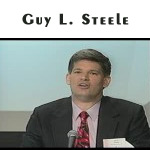 I found a really exciting video lecture by Guy L. Steele that I'd like to share with you. The title of the lecture is "Growing a Language".
I found a really exciting video lecture by Guy L. Steele that I'd like to share with you. The title of the lecture is "Growing a Language".
The main thing Guy Steele asks during the lecture is "If I want to help other persons to write all sorts of programs, should I design a small programming language or a large one?" He answers that he should build neither a small, nor a big language. He needs to design a language that can grow. The main goal in designing a language should be to plan for growth. The language must start small, and the language must grow as the set of users grows.
As an example, he compares APL and Lisp. APL did not allow its users to grow the language in a "smooth" way. Adding new primitives to the language did not look the same as built-in primitives, this made users the language hard to grow. In Lisp, on the other hand, new words defined by the user look like language primitives, language primitives look like user defined words. It made language users easily extend the language, share their code, and grow the language.
Mr. Steele also prepared a PDF of his talk. Download it here (mirror, just in case: here).
He currently works at Sun Microsystems and he is responsible for research in language design and implementation strategies. His bio page on Sun Microsystems page says: "He has been praised for an especially clear and thorough writing style in explaining the details of programming languages." This lecture really shows it.
I understood what he was up to from the very beginning of the lecture. Only after the first ten minutes Guy revealed that "his firm rule for this talk is that if he needs to use a word of two or more syllables, he must define it."
Another thing Guy Steele shows with this talk is how a small language restricts the expressiveness of your thoughts. First you must define a lot of new words to be able to express yourself clearly and quickly.
?Should a programming language be small or large? A small programming language might take but a short time to learn. A large programming language may take a long, long time to learn, but then it is less hard to use, for we then have a lot of words at hand — or, I should say, at the tips of our tongues — to use at the drop of a hat. If we start with a small language, then in most cases we can not say much at the start. We must first define more words; then we can speak of the main thing that is on our mind. [...] If you want to get far at all with a small language, you must first add to the small language to make a language that is more large.
He gives many more interesting points how languages should be grown. Just watch the lecture!
He defined the following words during the lecture: woman, person, machine, other, other than, number, many, computer, vocabulary, language, define, program, definition, example, syllable, primitive, because, design, twenty, thirty, forty, hundred, million, eleven, thirteen, fourteen, sixteen, seven, fifty, ago, library, linux, operating system, cathedral, bazaar, pattern, datum, data, object, method, generic type, operator, overloaded, polymorphic, complex number, rational number, interval, vector, matrix, meta.
